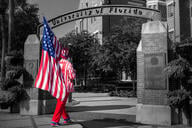You have /5 articles left.
Sign up for a free account or log in.
AUSTIN, Texas -- In Democratic Vistas, Walt Whitman made the case that the United States -- however successful as an economic and military power -- needed to promote more than literacy, but also the appreciation of culture and poetry to truly reach the nation's potential.
On the opening day of the annual meeting of the Modern Language Association here, community college instructors gathered for a panel discussion about what goes on in their classrooms. With a mix of idealism about their students and cynicism about policy makers, speakers discussed why literary scholars need to consider the role of community colleges in society and (perhaps) for their careers.
David E. Laurence, director of research at the MLA, opened with some numbers: more than 10 million students are enrolled at community colleges in the United States, and they make up well over 40 percent of American undergraduates. While the "popular narrative" focuses on these students' "academic deficits," he said, their sheer number should lead educators to see them as worthy of more than "a practical literacy," but of "humanistic reflection about literature."
He quoted Judith Butler, the Maxine Elliot Professor of Comparative Literature and Critical Theory at the University of California at Berkeley, from her essay "Ordinary, Incredulous" to explain why all students, from all parts of society, need a full education. "Many of us have made the case for the humanities by arguing that without cultural and even public literacy it is not possible to engage as a mindful citizen in civic and democratic processes, if not more far-reaching forms of democratic struggle," Butler wrote. "We have to be able to read the newspaper or understand and evaluate images in television and film, on video, and on the kiosks of the street if we are to find our way with those parts of the world that present themselves to us commonly, which does not mean they present themselves to us all in the same way …."
Education for everyone is a worthy goal, but not necessarily an easy one, said those here who teach community college students, and who spoke primarily of teaching composition, although that instruction frequently includes reading literature and reacting to it.
Melissa Flanagan, chair of English at Santa Fe College, in Florida, said she worries that too much discussion of English instruction at community colleges focuses solely on the question of "Who is college ready?"
In her state, legislative mandates now permit students at community colleges to bypass placement tests and to ignore their results, so college-level writing courses now always include a wide range of students -- from those in the honors program to those who would before the new law have been forced to take remedial courses.
She said there is no doubt that the new law has made things more difficult. But based on discussions she has had with faculty colleagues, she is struck by the way some students who would have been identified as needing remediation are in fact succeeding. Flanagan said this was not universal, but was generally associated with faculty members spending extra time with those students.
Faculty colleagues have also reported that some students who needed remediation and enrolled in college-level courses anyway said "thank you" when getting back early papers with F's. Students wanted to be told honestly what they need to do, and at least some of them are able to then improve rapidly.
Frustrated instructors need to remember the clear link between economic class and the quality of high school instruction students receive, she said. When they keep that in mind, they may do a better job of reaching students. "Students need to feel that they are going to be more successful."
Ian Sherman-Youngblood, professor of English at Green River College, in Washington State, also urged those teaching writing to disadvantaged community college students (as many in the audience said was their norm) to find ways to do so that affirmed students' identities. Teaching students -- many of whom are immigrants (some refugees) or first-generation college students who never learned proper English -- isn't just about the rules and vocabulary and writing techniques.
“How do we as educators create a space where marginalized students, students of color, students whose first language is not English, in which their space of self is not violated by academe?" he asked. If students are told that learning the English he and others teach involves rejecting their own culture, they are likely to drop out, he said.
Sherman-Youngblood described using the method of mockery: he teaches them academic writing styles and then how to mock those styles, how arbitrary some words and rules are. He demonstrated to the audience an exercise in which he asks students to consider the meanings of the relatively similar words "deep" and "profound." Helping students understand that, while these words can have similar meanings, a professor might prefer to be called "profound" is an act of "letting the students see the man behind the curtain."
Including the mocking exercises, he said, makes it possible for students to use academic English to succeed in their courses and get better jobs -- while not feeling that their upbringing is being questioned. "My job isn't to tell them my way of speaking is better, but to say that it will give them access to power in their lives," he said.
One audience member who teaches in an urban area with students who have generally received a poor high school education said that she has bright students who can't speak or write well. Mastering composition is the key for them. "My job is to get students so they could be hired as a dental hygienist," she said.
The Job Market and Doctoral Training
The discussion here came at a time when the job market for new literature and language Ph.D.s is tight and getting tighter.
There are many community colleges, however, that are hiring, some to tenure-track jobs. Flanagan said that her department hired five Ph.D.s or A.B.D.s in recent years for full-time, tenure-track positions. Many English departments can't boast of such hiring.
Some graduate programs train their doctoral students for jobs at institutions other than those that grant doctoral degrees. But when the panel was asked if doctoral programs were training students to work at community colleges, one audience member couldn't wait for the panel and shouted out, "Absolutely not." The audience member said she had received no training at all and had to buy books to teach herself "how to teach at places without admissions standards."
Flanagan said she realizes many Ph.D. programs don't talk about community college teaching. She said she encourages doctoral students to adjunct for a course or two -- to learn and to figure out if they have the calling to teach at a community college.
Class Size and Fire Marshals
But while the idealism of the panelists clearly was inspiring to some in the audience, the speakers were also honest about the challenges.
Flanagan said that she's currently lobbying her college to cap composition courses at 18 students, down from the norm of 20-22 today. When faculty members are teaching five sections a semester, she said, they are challenged to provide the attention students need. A cut to 18 would make a big difference.
Several audience members spoke of having much larger class sizes than the current norm at Santa Fe.
One person suggested a strategic ally for community college instructors. At her college, fire marshals set limits for capacity of some classrooms at levels well below what the college considered maximum class size, so now the instructors teaching in those classrooms have manageable class sizes.




